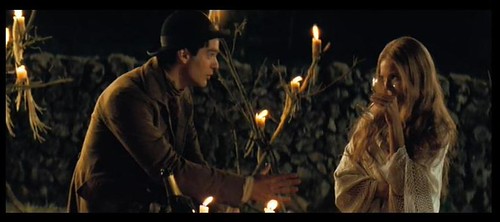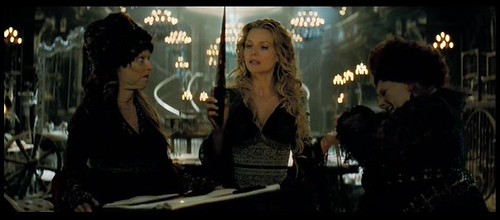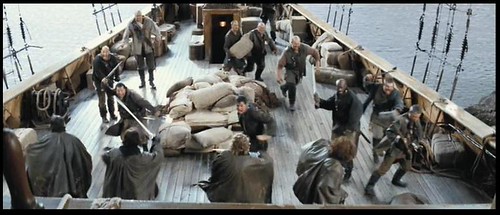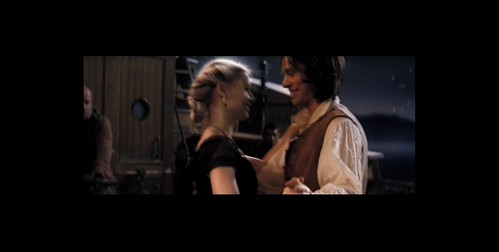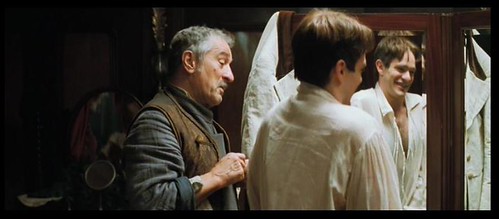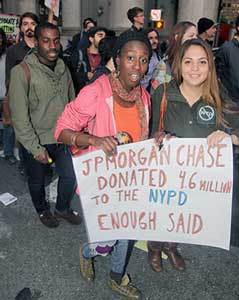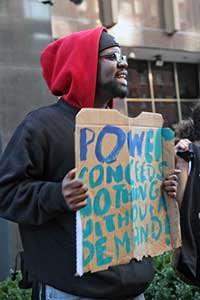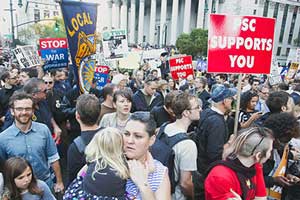When NBC's
Playboy Club became the first series of the fall season to get the axe, the real question was why did it ever air in the first place? The Water Cooler Set avoided that question to protect their own self-interest.

See, in a world with functioning media criticism, things like
Playboy Club would never air and embarrassments like
Morning Edition last week would be called out. But the Water Cooler Set didn't go there either. Instead, they were too busy rushing to be part of the group hug and demonstrating just how stupid they are.
And they really are stupid.
We'll get to the bunnies as well as the bias of
Morning Edition. But don't we all enjoy a laugh at our lessers? So let's start there.
Thursday night,
Parks and Recreation aired an episode entitled "Born & Raised" which was written by Aisha Muharrar. We've praised
Parks and Recreation before several times and been among the few to do so. Thursday's episode finally caught the Water Cooler Set's attention. And as they raved and gushed all last week, it really demonstrated how shallow and stupid the Water Cooler Set is.
Chicago Now's Andrew Daglas not only wanted to instruct readers on satire, the pompous ass also wanted you to know (among other things), "An episode like 'Born and Raised' shows beautifully how to wield satire lightly but pointedly, and still retain the heart to want to make the world better even for the 'goofballs' who live in it." The goofball is actually Daglas, but we're not done naming names.
Sexist James Poniewozik (TIME magazine) found himself loving the show all the sudden, "Last night's
Parks and Recreation,
'Born and Raised' -- in which
Leslie Knope encountered the Pawnee version of birtherism -- was the strongest yet of the new-season episodes and one that gives me great hope for what it can do with her campaign storyline."
Jen Chaney (Washington Post) gushed, "Tonight’s episode of '
Parks and Recreation' pulled off an impressive hit trick, delivering a genuinely funny episode, a 30-minute product placement for a new book and a scathing satire of the birther moment."
We could go on and on, kids, but what better way to note how stupid the Water Cooler set is than to point out that
Docker Boy Bill Carter (New York Times) finally found the time and energy to cover and praise Parks and Recreation.
Why now?
The alibi he hides behind is: "Judging by increasingly
favorable critical comment, along with the endorsements on Internet sites and enthusiastic word of mouth, the four-year-old comedy has found its comic voice."
Oh, okay.
Except "increasingly favorable critical comment" was what?
Alessandra Stanley writing for The New York Times in February of last year. (For the record, since her name's showing up here, we do not consider Stanley to be part of the Water Cooler Set. She goes her own way and is no one's club mascot -- good for her.) Alessandra praises the program in February and eight months later Docker Boy publishes an article on it? His research notes -- and expense account! -- must be epic.
Reality, he wrote about it last week because of the buzz NBC was building around the show for what the critics call (and NBC sold as) "the birther story." If you're confused, "birthers" is the name the media gave to people questioning Barack Obama's birth place. If Barack were not born in the United States, it is argued, he could not be president.
Doubts emerged for a number of reasons including the fact that the media always tried to soft peddle the fact that Barack Obama Sr. would have been a bigamist if he was married to Barack's mother Stanley Dunham. A press that hides bigamy isn't exactly a trusted press and the media had long educated Americans on bigamy. In fact, the TV movie often seemed to exist in the 70s and 80s just to explain to America that the second wife would have to get a divorce but she was not, by US law, legally married to the already married man.
Other reasons doubts may have emerged? It could be the refusal to explore Ann Dunham's government work. Or maybe the fact that
at least one press report when Barack was elected to the US Senate declared his birth place was Kenya. Or it could be the fact that his only living relative who could have spoken of his birth was hidden away throughout 2007 and 2008.
Roberta McCain, by contrast, was all over the campaign trail. She was 96-years-old. But that's what family does. Or what it's supposed to do. Barack's grandmother couldn't even be bothered with giving interviews via the telephone during her grandson's run for president -- her only grandson . . . that she partially raised.
It never made sense because in the US, when you run for office, your family does as well. No one doubted, for example, that Dr. Judy Dean existed. But her refusal to take part in her husband Howard's campaign didn't set well with Americans. It raised many questions. After Dean became less of a 'winner' in the Democratic Party's primaries and while he was on the ropes, both Deans would grant Diane Sawyer an interview for ABC.
We include that because when your family doesn't participate, questions are raised. That's nothing new and shouldn't be surprising.
You can say it's uncommon to raise issues of birth place and eligibility in a presidential contest.
The press certainly does say that.
The press that kissed Donald Trump's ass for years until, in 2011, he began raising questions about Barack's birth certificate.
Remember how we were just talking about Roberta McCain? How at 96-years-old she was on the campaign trail, she was granting interviews, she was doing anything and everything to see to it that her son had a shot at the presidency while the woman Barack publicly called "
my own White grandmother" couldn't even tape a commercial, couldn't even tape a radio interview, wouldn't do a damn thing for him.
You know what else was strange?
The press pretending they have no interest in eligibility due to birth.
Today they insist that wasn't them. Today they ridicule those who ask questions. That's today.
But what about in the last presidential race?
Carl Hulse's 2008 article was entitled "
McCain's Canal Zone Birth Prompts Queries About Whether That Rules Him Out" (
New York Times). See, McCain was born at a US military installation because his father was in the service, a US military installation outside the US. And it was an issue for the press. In fact, it was an issue to them when McCain first ran for president. There was little in Hulse's 2008 article that hadn't already been covered by Ken Rudin, writing for
The Washington Post, in July of 1998, "
Citizen McCain's Panama Problem?" What Rudin could explain in two paragraphs, ten years later, the press was teasing into long articles.
The New York Times couldn't stop going to the well on this story in 2008 and readers loved these articles, they always posted high on the day's top read pieces at the paper's website. Carl Hulse covered it again
in February 2008 anod
again in May of that year. The popularity of these articles might explain why, as late as July 11, 2008, the paper was still filing lengthy articles on the issue such as Adam Liptak's "
A Hint of New Life to a McCain Birth Issue." There were more reports, there were opinion pieces (
such as this one) and if you think the print edition of the paper was obsessed with John McCain's eligibility, you need to check out the work done by the paper's political blog
The Caucus.
Eligibility was fair game for McCain whose father was a well know, press covered, military man and whose mother lived with McCain's father (and was legally married to him) and was still alive and happy to talk about her son. But this new-to-the-national-political-scene Barack must not be asked any questions, insisted the media.
It's rightly noted how the press, like locust, descended upon Wasilla, Alaska in September 2008. What's less often pointed out is that the press' double standard started with the way they treated John McCain in 2008 when compared to how Barack was treated.
The press ran with, wouldn't let go of, the eligibility issue. And yet when Americans had some honest questions about eligibility as applied to Barack, the press derided them as "birthers" and acted as if the issue of eligibility was something only crazy nuts had ever discussed. In deriding them, in attacking them, the press encouraged the rumors.
The press very rarely takes responsibility for its own actions.
And they attacked Donald Trump because the questions he raised came at a time when, as evidenced by the polling, America was beginning to ask questions about what exactly Barack stands for and exactly who is he?
Regardless of where Barack was born or not born, Donald Trump, in 2011, was a living, breathing monument to the refusal of the press to ask the needed questions in 2007 and 2008 about all the candidates. Which is why, this year, the press finally turned on Donald Trump.
And that 'birther' issue is why the press decided last week that they loved, loved
Parks and Recreation.
But in 'loving' it, they revealed how stupid they were.
It was a great story they all insisted and so funny and a few (including one we linked to above) even got in the name of the notorious female whose filed one lawsuit after another on Barack's eligibility.
But while they were laughing, they seemed to miss a main point. Leslie Knope (Amy Poehler) is running for local office and she's pushing a book she wrote as well. She goes on TV and is confronted with the accusation that she's a liar and she wasn't actually born in Pawnee. Leslie denies the accusation. Speculation builds damaging a book signing.
And?
Leslie finds out she wasn't born in Pawnee.
If that was supposed to be -- what did
The Washington Post call it, oh, yes, -- "a scathing satire of the birther movement," we're confused. Because the accusation, on the TV show, was true.
So the Water Cooler Set, please grasp this because they didn't, spent last week praising an episode for sending up the so-called birther movement when, in fact, the episode's resolution was finding that the people were correct about Leslie not being born in Pawnee.
That's how stupid the Water Cooler set is. Thinking is hard for them so they must run and write in packs.
If they didn't, they would have been calling out
Morning Edition last week.
Steve Jobs died last week and, despite the fact that we both knew him, we feel like yawning at this point. In fairness to Jobs, that reaction has little to do with him and everything to do with the press and their glomming on his death.
Friday,
Morning Edition aired a 640 word segment on Jobs' death and we found that to be excessive all by itself. "All by itself" meaning: That's before you consider Thursday's broadcast.
On that show, they aired
one,
two,
three,
four segments on the passing of Steve Jobs which all together broadcast 2731 words.
If that doesn't seem excessive to you, you may be suffering media damage. Steve Jobs always struck us as a nice person. We never had a problem with him. But we're struggling to figure out how his death warrants 2731 words from one NPR program let alone, nearly 2400 words (add Thursday and Friday's
Morning Edition segments together).
And you can think we're mean and rude and harsh -- and maybe we are. But we know that we use speed dial all the time but have never given a thought to who invented it. Same with the microwave or wireless modems or any other technology.
We do care about those who've changed the world -- not changed the consumer, mind you, changed the world.
The Reverend Fred Shuttlesworth died last week as well.
If you're asking, "Who?," you're probably suffering from some major broadcast media damage.
Elaine Woo (Los Angeles Times) opened her obituary of Shuttlesworth with this sentence, "The Rev. Fred L. Shuttlesworth, a blunt-talking preacher who braved beatings, bombings and fire-hosings to push Birmingham, Ala., to the forefront of the civil rights movement and advanced the historic fight with a confrontational strategy that often put him at odds with its most charismatic leader, died Wednesday." That was echoed in the opening of
Jon Nordheimer's (New York Times) obituary: "The Rev. Fred L. Shuttlesworth, a storied civil rights leader who survived beatings and bombings in Alabama a half-century ago as he fought against racial injustice alongside the Rev. Dr. Martin Luther King Jr., died on Wednesday in Birmingham, Ala."
Some might argue that racism is the reason that
Morning Edition pretty much ignored Shuttlesworth while incessantly raving over Steve Jobs (Shuttlesworth was African-American, Jobs was considered Anglo White -- his birth father was Syrian) and there might be a strong argument to be made there. We're not denying that there is. But what it struck us as, listening to the excited voices on Jobs and the ho-hum (by contrast) on Shuttlesworth was that Jobs was 'techy' and 'new' and 'rich' and 'trendy.' Shuttlesworth? Just someone with convictions who'd been willing to risk life and limb for equality.
648 words was what NPR thought this heroic person deserved. If Shuttlesworth had been a multi-millionaire, might they have given him 1,200 words?
What the press chooses to value is screwed up and you'd be wise to bookmark that and return to it the next time some gas bag starts whining about Americans and their values. The press never wants to take responsibility. They obsess for over half of 2008 about John McCain's eligibility and then get surprised when news consumers wonder, "What about the other guy?" They obsess over the death of someone who more than hit the jackpot financially while treating the passing of a true American hero as barely worth noting.
The press is the reason something like
The Playboy Club even aired to begin with.
Every network should have run from the stink of this series. One of the partners in the show was Hugh Hefner (via his Playboy Enterprises). The notion that Hugh Hefner is a disinterested party is laughable. Though billed as a "historical drama," this was always going to be revisionary history, one that, in Playboy's apparent final days, would turn Hef into a political player and equality fighter -- history and facts be damned.
Which is why the show featured a closeted lesbian bunny (played by Leah Renee) married to a closeted gay man (played by Sean Maher). The two knew their sexuality, it was a marriage for cover. They're starting a Mattachine Society in Chicago. See the problem? Ike and Tina Turner show up at the Playboy Mansion to perform "Make Me Over" and "Shake A Tail Feather." See the problem?
It's not just that the 1961 show features women in a modern version of mid-to-late sixties eye make up and hair styles, it's that it trashes history completely. NBC pushed "Make Me Over" as "Tina's Wish" -- which is in the film
What's Love Got To Do With It? -- but the song was first recorded by Ike and Tina Turner as "Make Me Over" on the 1973 album
Nutbush City Limits. "Shake A Tail Feather"? Forget Ike and Tina's cover, the song wasn't even written until 1963. As for Chicago's Mattachine Society? It can be traced back to 1955. 1961 was the year that the Mattachine Society broke up as a national group -- due to the emphasis on local chapters.
Chicago Metro History Education Center notes, "Chicago's chapter of the Mattachine Society was established in the early 1950s and is noted for putting together a vital handbook of gay and lesbian' legal rights. Pearl Hart, a Chicago lawyer, was instrumental in advising the Chicago chapter on this handbook. She was also one of a handful of lawyers who would take on lesbian and gay rights cases in the 1950s. Along with Henry Gerber, she is remembered and honored today in the organizational name of the Gerber Hart Gay and Lesbian Library." Pearl Hart, an actual person, a thinking person, an attorney and an activist, and all of her work is rendered invisible so that we can pretend a Playboy bunny and her husband started Chicago's chapter of the Mattachine Society in 1961.
Along with rewriting history -- excuse us, replacing history with fantasy, the show also embraced sexism as most knew it would. Women were expected to show their flanks repeatedly and to be undressed regularly. While the men? Kept it covered unless they were gay men. (We're referring to the characters on the show, not the actors.) Women were shown in Bunny outfits, of course, they were also shown half in them (and half out), wearing only a man's shirt, wearing nighties, wearing bras, you name it. The hottest male actor on the show, Eddie Cibrian, was in a towel for one scene. He was supposed to have taken a shower before the camera found him at a bedroom mirror combing his hair. There was one brief shot of the room and Eddie (in profile) where you saw the towel. The rest of the time, the camera seemed nervous with the fact that Eddie was in a towel which would explain why all other shots ended about mid-nipple on Eddie. The cameras lingered and worked their way up and around the female forms but when a male worth looking at finally is in a towel, everyone got nervous.
(Gay male characters and female lesbian characters were filmed roughly -- bad lighting, bad angles. The positive take is that at least Hef didn't resort to "lipstick lesbians," the alternative take is that someone running the show has a really negative opinion of lesbians and gay men.)
Little stories ran throughout, like the lesbian subplot or a woman doesn't want to be on the cover of Playboy. Usually you saw them coming long before the other characters did. And at times, it all played out like a sad campus production of
And Then There Were None.
The big plot was supposed to be covering up a murder. A gangster tried to rape Maureen (Amber Heard) at the club and Nick (Cibrian) tried to stop him. As the gangster attacked Nick, Maureen killed the man.
Long before his son (Troy Garity -- in one of the few cases of actual acting the show offered) showed up near the end of the first episode looking for his father, you knew the secret wasn't going to stay secret and that it was unbelievable a mobster -- a head mobster, at that -- disappears and no one's going to be asking questions. In Chiago, no less.
From all accounts, the mob was very much a presence in the early days of Playboy so it makes sense that the show would feature it. It just didn't make sense that the show would portray the mob and the club as being at odds with one another -- until you remembered this was revisionary fantasy and not historical fact.

Once upon a time, as we've pointed out many times, the TV critics used their power for good. They used it to champion worthwhile shows and TV movies and mini-series. Entertainment that could nourish the mind. These days, all they want to do is run with the pack. Did they even watch all of
Parks and Recreation's "Born & Raised" episode before weighing in? (You'll notice that we had no problem naming the writer of the episode yet no one in the Water Cooler Set managed to.) Where were they while
Morning Edition was lavishing Steve Jobs with kisses and turning Fred Shuttlesworth into a footnote?
Time and again, they misuse and abuse the power they've been given. Instead of making the hard calls, they write for one another, mirroring one another's judgment and becoming text book cases of group think. If you wonder how something as horrible as
The Playboy Club ever made it on to the air, if you wonder why TV is so often so very bad, look no further than the Water Cooler Set. Those who are supposed to be the watch dogs, those who are supposed to be the police officers of the media beat, long ago turned into crooked cops more interested in pleasing one another than in actually assisting the public.






